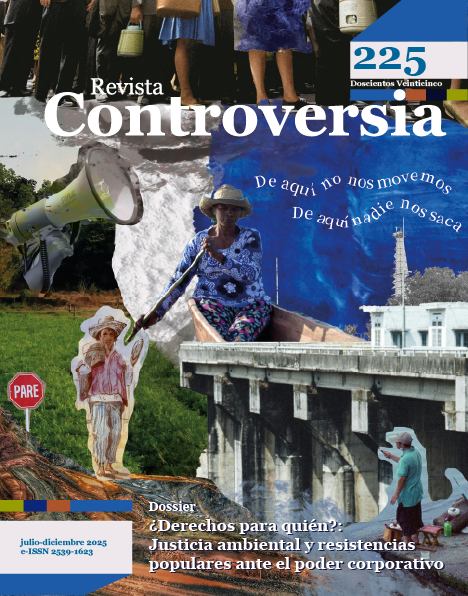Abstract
This article addresses the relationship between Business and Human Rights through the case study of an oil spill that occurred on Mompox Island, Colombia. We reconstructed the information based on fieldwork, interviews with community leaders, and the study of legal documents. Reflecting on this information, and after a brief review of the field of Business and Human Rights, we argue, drawing on authors such as Laura Bernal and Carolina Bejarano, that given the limitations of the international regulatory framework, local communities have developed their own mechanisms of justiciability through bottom-up justice practices, making use of gender-sensitive approaches. In this way, the article illustrates: i) how reparations, beyond merely restoring things to their original state, address basic needs when violations occur in contexts of high vulnerability, poverty, or inequality, ii) the extent to which legal processes fail to draw on relevant sources of International Law to address such violations, and iii) how a gender-sensitive approach, beyond being transformative, must also respect the communities’ own proposals, visions, and initiatives.

This work is licensed under a Creative Commons Attribution-NonCommercial 4.0 International License.
References
Ascencio, Christine; Singh, Nitish y Alhorr, Hadi (2024). Recognizing the rights of “others”: A framework for corporate human rights violations in international business. International Journal of Cross Cultural Management, 24(1), 101-128. https://doi.org/10.1177/14705958241229288
Bernal, Laura; Pereira, Gabriel; Payne, Leigh (2021). Justicia transicional y rendición de cuentas de actores económicos, desde abajo: desplegando la palanca de Arquímedes. Dejusticia. https://www.dejusticia.org/publication/justiciatransicional-y-la-rendicion-de-cuentas-de-actores-economicos-desde-abajodesplegando- la-palanca-de-arquimedes
Bejarano, Carolina (2024). Gente de mar: expansión urbana, luchas étnico-territoriales y jurisdicciones contingentes en Cartagena de Indias [Tesis de doctorado, Universidad de los Andes]. Séneca Repositorio Institucional. https://hdl.handle.net/1992/75122
Contraloría General de la Nación (2002). Informe sobre la explotación petrolera. Estudio de caso campo petrolero Cicuco-Boquete.
Flórez, María Juliana y Olarte, Carolina (2023). Decolonizing Approaches to Latin American Social Movements. En Federico Rossi (Ed.), The Oxford Handbook of Latin American Social Movements (pp. 123-140). Oxford University Press. https://doi.org/10.1093/oxfordhb/9780190870362.013.47
Götzmann, Nora; Bourke, Joanna; Meyersfeld, Bonita y Kaur, Harpreet (2022). From Formalism to Feminism: Gender, Business and Human Rights. Business and Human Rights Journal 7(1), 1-11. https://doi.org/10.1017/bhj.2021.61
Guillerot, Julie (2009). Reparaciones y género: Hacia una perspectiva transformadora para América Latina y el Caribe. Centro Internacional para la Justicia Transicional (ICTJ). https://hchr.org.mx/wp/wp-content/themes/hchr/images/doc_pub/241109Reparaciones.pdf
Knuckey, Sarah y Jenkin, Eleanor (2015). Company-created remedy mechanisms for serious human rights abuses: a promising new frontier for the right to remedy? The International Journal of Human Rights, 19(6), 801-827. https://doi.org/10.1080/13642987.2015.1048645
Nissen, Aleydis (2023). Gender-Transformative Remedies for Women Human Rights Defenders. Business and Human Rights Journal, 8(3), 369-402. https://doi.org/10.1017/bhj.2023.41
Ojeda, Diana (2022). El punto ciego de la propiedad: Género, tierra y despojo en América Latina. REVISTA TRACE, 81, 106-131. https://www.trace.org.mx/index.php/trace/article/view/812
Organización de las Naciones Unidas (ONU) (2011). Principios rectores sobre las empresas y los derechos humanos: Puesta en práctica del marco de las Naciones Unidas para “proteger, respetar y remediar”. Oficina del Alto Comisionado de las Naciones Unidas para los Derechos Humanos. https://www.ohchr.org/sites/default/files/documents/publications/guidingprinciplesbusinesshr_sp.pdf
Organización de las Naciones Unidas (ONU) (2019). Informe del Grupo de Trabajo sobre la cuestión de los derechos humanos y las empresas transnacionales y otras empresas comerciales. Consejo de Derechos Humanos de la ONU. https://undocs.org/es/A/HRC/41/43
Organización de las Naciones Unidas (ONU) (2000). Pacto Global de las Naciones Unidas: Diez principios universales para la sostenibilidad empresarial. https://unglobalcompact.org/what-is-gc/mission/principles
Organización para la Cooperación y el Desarrollo Económicos (OCDE) (1976). Directrices de la OCDE para empresas multinacionales. https://www.oecd. org/corporate/mne
Palombo, Dalia (2017). Business and human rights: The obligations of the European home states [Tesis de doctorado, Maastricht University]. https://cris.maastrichtuniversity.nl/en/publications/ business-and-human-rights-the-obligations-of-the-european-home-st
Rivera Cediel, Helena Catalina (2024). Cuerpos de agua: un derecho salvaje para el antropoceno a partir de las ciénagas de La Mojana [Tesis de doctorado, Universidad de los Andes]. Séneca Repositorio Institucional. https://hdl. handle.net/1992/74198
Simons, Penelope (2012). International law’s invisible hand and the future of corporate accountability for violations of human rights. Journal of Human Rights and the Environment, 3(1), 5-43. https://doi.org/10.4337/jhre.2012.01.01
Simons, Penelope y Handl, Melisa (2019). Relations of Ruling: A Feminist Critique of the United Nations Guiding Principles on Business and Human Rights and Violence against Women in the Context of Resource Extraction. Canadian Journal of Women and the Law, 31(1). https://doi.org/10.3138/cjwl.31.1.06
Tribunal Administrativo de Cundinamarca. Sección Segunda, Sub-Sección D. M. P. José Antonio Molina. Expediente A.P N 00-38. 4 de abril del 2006. Comunicaciones personales
Álvarez, Martha (Cicuco, agosto del 2024) Entrevista de Helena Catalina Rivera Cediel.
Rico, Reinaldo (Cicuco, septiembre del 2024) Entrevista de Helena Catalina Rivera Cediel.




